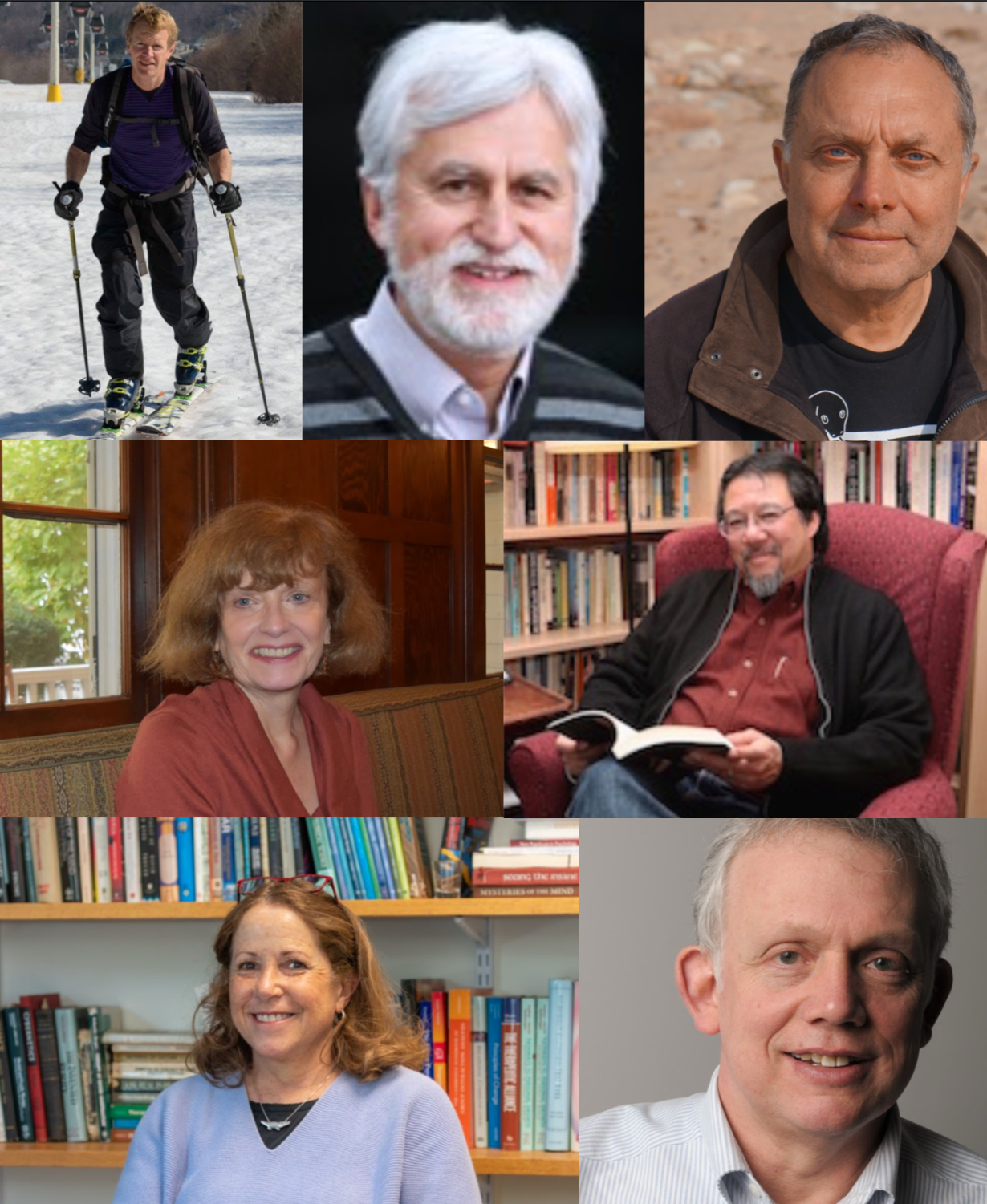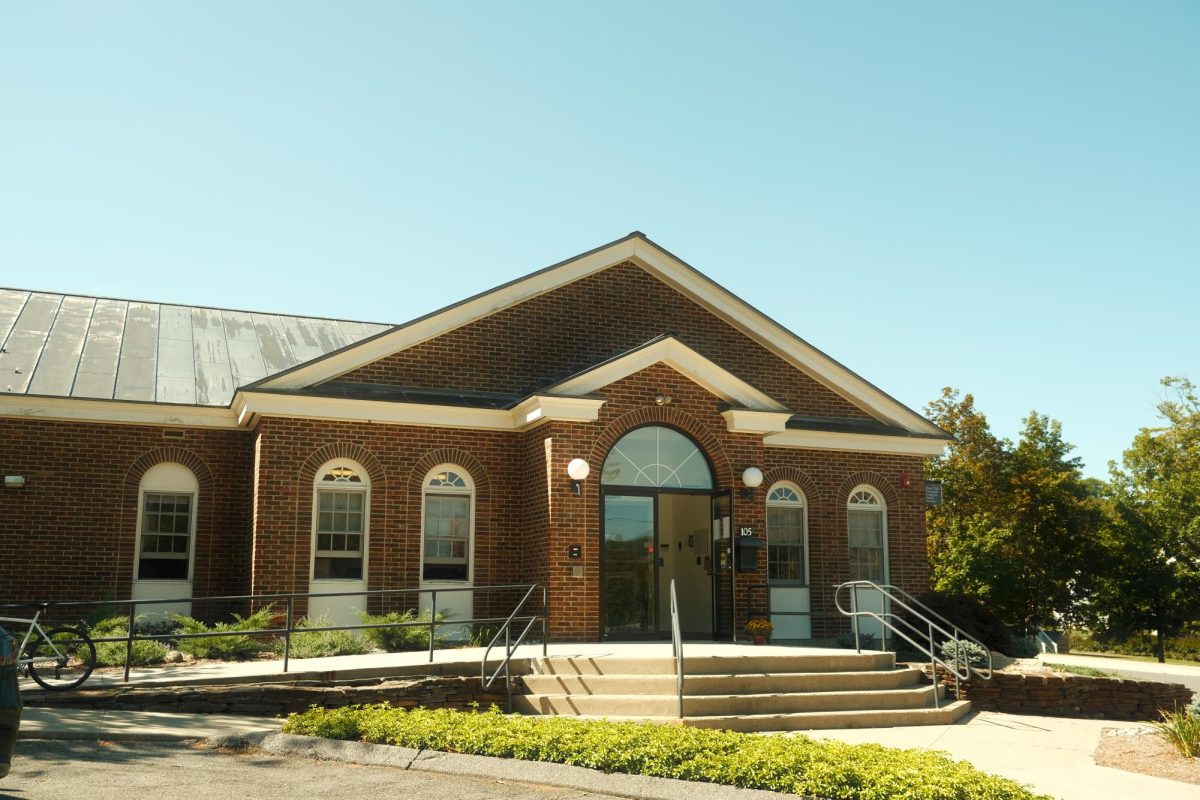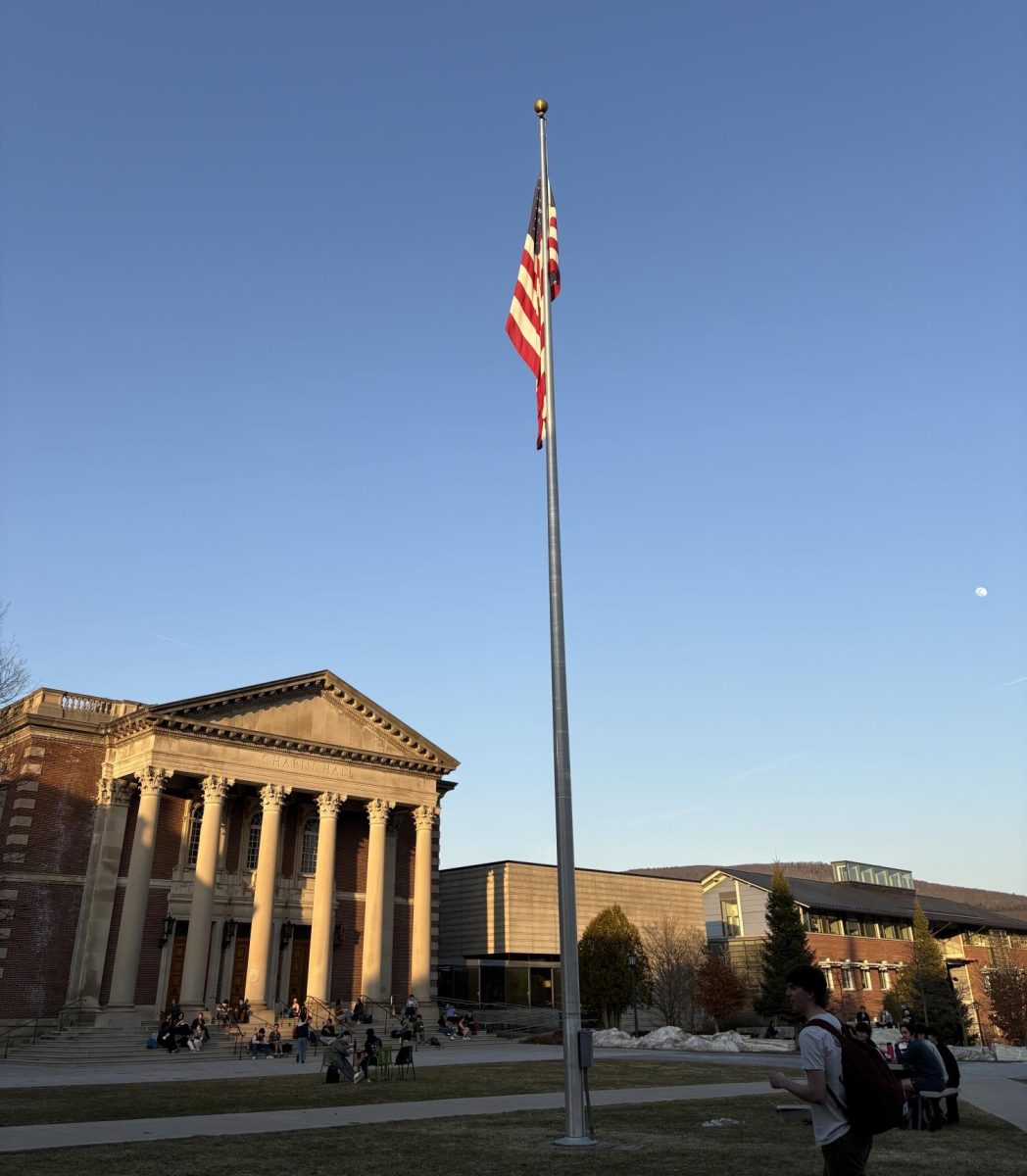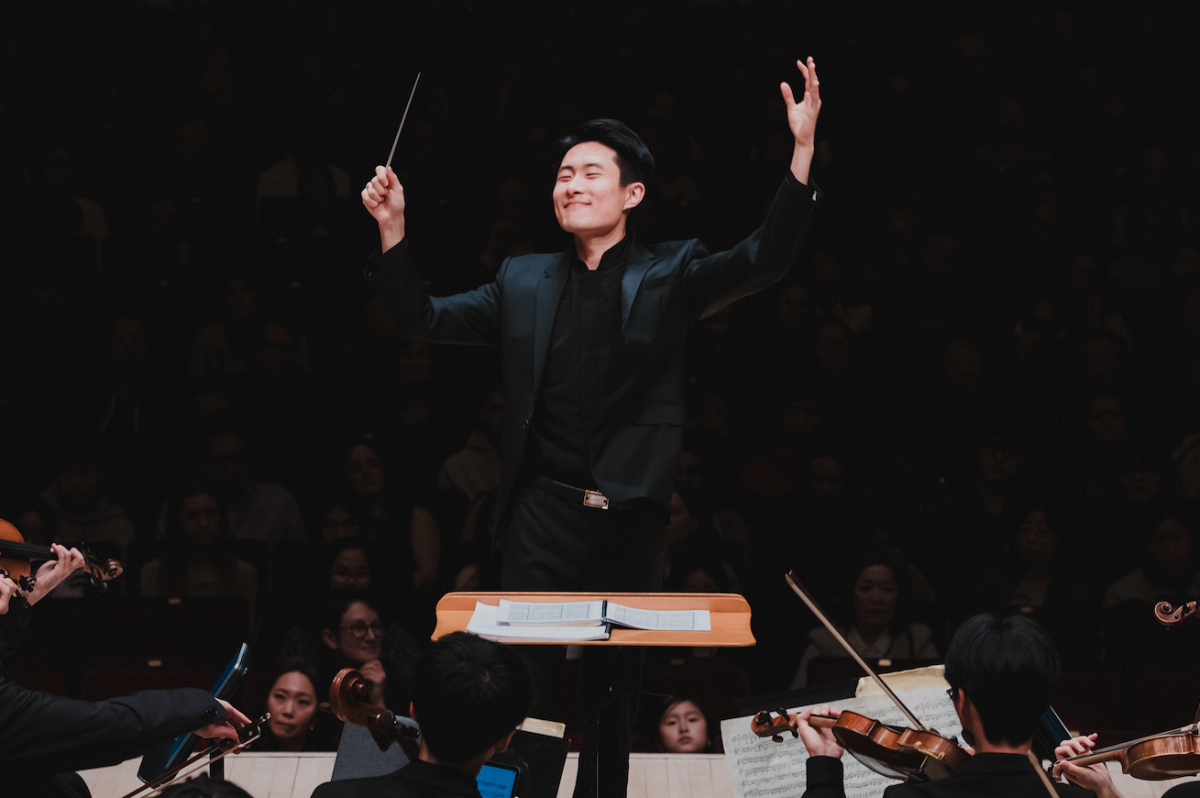Seven professors retiring from the College this year
February 16, 2022

The College has announced that seven faculty members are retiring during this academic year: Professors Ben Benedict, Jerry Caprio ’72, Helga Druxes, Laurie Heatherington, Paul Park, Duane Bailey, and Scott Wong.
Ben Benedict, Professor of art history since 1997
Benedict retired at the beginning of this year after 25 years of teaching art history and studio art at the College. Motivated by a love for teaching, Benedict is grateful for his many years at the College. “It was just my great privilege to teach and I guess I would still be doing it if I didn’t feel like the window of opportunity to do other things was closing,” he said.
One of the highlights of his time at the College was the building projects in the advanced studio — the most recent of which could be found last fall between Hopkins Hall and Sawyer Library. “Every time I walked through the door of the architecture studio, I had a big smile on my face,” he said.
Benedict has visited many of his former students over the years and has written numerous recommendations for his students applying to graduate school programs. He said that he appreciates the variety of career paths students pursue after attending the College. “The whole idea of a liberal arts college makes tremendous sense to me more and more as life and times change,” he said.
Currently, he is on what he calls his “Emeritus Tour,” a six-week-long ski tour across the country that he had postponed for almost fifty years, since his college graduation. “I’ve always wanted to go on that extended tour that I suppose lots of my friends did when they graduated from college, they took a year and did something wild and strange but I couldn’t afford to in many ways,” Benedict said. He also plans to continue working in his architecture firm and on his farm, as well as on his car collection. “I’m not a person to sit around, so I don’t think that I’ll have any trouble finding things to do,” Benedict said.
Jerry Caprio ’72, Professor of economics since 2006
Caprio graduated from the College in 1972, where he first became interested in economic development. “One of my advisors, his name was actually Bill Gates ’39, came back to Williams after working as a United States Agency for International Development (USAID) officer,” Caprio said. “I remember before I went off to graduate school, [Gates] suggested I get some experience some place else so that I could bring something different back to the College.” Caprio took this advice to heart and returned to the College after 34 years, having gained a variety of work experience including at the World Bank and JP Morgan.
According to Caprio, the Center for Development Economics (CDE) — a master’s degree program designed for economists from low- and middle-income countries — was the key reason for his return to the College.
Caprio said the students at the CDE have been a particularly memorable part of his teaching career. “They’re dedicated to get the maximum out of what they learn while they’re here, as they’re only here for ten months,” he said. “And so often, they’re eager for class to start and then they don’t really want it to end.”
Even though he is officially retiring this year, Caprio has already signed on to teach a CDE course in spring 2023.
Caprio told the Record that he thinks it may be challenging for him to fully step into retirement, but he said he also hopes to continue his research on financial regulation and climate change, play classical guitar, and travel. “It’s just been a delight,” Caprio said of his time at the College. “Williams has what’s known as the most talented econ department among all the liberal arts schools, and it’s really just a great experience [to] interact with [the students and faculty] in it.”
Helga Druxes, Professor of social studies since 1987
Druxes has taught German studies and comparative literature at the College for 35 years. According to Druxes, both departments have increased in diversity of staff, students, and content. “We moved away from literature survey courses and into more interdisciplinary approaches to literature and art combined with social history and psychology,” Druxes said. Highlights of her time at the College include taking students on field trips to experience cultural events and speak with German writers. “[My] favorite memory [is] the many really smart students from all kinds of backgrounds whom I taught to express themselves more powerfully,” Druxes said.
After she retires, Druxes said she plans to begin new research, as she just completed a book manuscript written with two colleagues entitled “Screening Solidarity: International Cinema Confronts Western Neoliberalism”. She also said she is excited to have leisure time to read more often and to learn creative writing through a workshop at the PEN Center for German-Language Writers Abroad. Outside of the College, Druxes also works for PEN as a secretary. “I enjoy my volunteer work, I help organize readings for poets, translators, and writer-activists,” Druxes said. “During the pandemic, I reached out especially to some of our older members. Getting to know Holocaust refugees or former German Democratic Republic (GDR) dissidents who were imprisoned is deeply meaningful to me.”
“I am truly grateful for the academic freedom my departmental and program colleagues, and the College as a whole, afforded me to develop courses on a broad range of topics in the 20th and 21st centuries,” Druxes said.
Laurie Heatherington, Professor of psychology since 1984
Heatherington began teaching at the College 38 years ago. At this time, she was the first faculty member hired in the area of clinical psychology, as well as the first woman hired as a tenure-track assistant professor in the psychology department at the College. Heatherington said one of the highlights of her time at the College has been creating and teaching a course on clinical and community psychology, an advanced seminar with six hours per week dedicated to field work in local agencies that focus on mental health and social services. “It was a lot of fun getting to know the community partners in local agencies and supervising the students’ exposure to the ‘real world’ of helping others,” Heatherington said.
Heatherington told the Record that she is planning to work on some writing projects that she has saved for her retirement. Additionally, she said she hopes to visit family in Boston and spend time camping and hiking. “On some good advice that I got from a recently-retired friend, I’m considering next year a ‘gap year,’” Heatherington said. “I went straight to college from high school, from college to grad school, and from grad school to my first job, so I’m not making any new commitments until I explore this sense of freedom ahead.”
Heatherington expressed gratitude for the professional and personal growth she found during her career. “I think that the single most rewarding aspect of my time at Williams has been working with students in the classroom and lab and the close relationships that we have formed and that continued well beyond their graduation, and to this day, in fact,” Heatherington said.
Paul Park, Professor of English since 2002
When Park first started at the College, he taught expository writing courses during Winter Study before he first became a professor. Since then, he has taught a wide variety of courses, but he said that it has especially been a joy to see the growth of students throughout these expository writing courses. Park began his professional life as a science-fiction writer, and has published many novels during his career, but did not have a similar background to many of the other English professors at the College in terms of his education. He expressed gratitude to all of his colleagues who welcomed him into the department regardless, and for the chance to create his own classes, an opportunity not afforded to professors at all colleges.
According to Park, the English department has changed significantly since he first started teaching, as there are fewer majors and a decreased emphasis on the prominence of strictly English literature throughout the department. “I actually think that it’s an exciting time to think about refiguring the English major and taking a look at what studying English literature means and the way it fits into the broader curriculum [at the College],” Park said.
Post-retirement, Park said he hopes to work on multiple writing projects. He plans to stay in Williamstown, as his sister, Jessica Park, lives in their childhood home and works at the mailroom. “I’ve had wonderful students, people that I still get in touch with or with whom I became friends,” Park said. “And there’s something about the kind of emphasis that Williams has on the classroom experience that I think is really valuable.”
Duane Bailey, Professor of computer science since 1988
Bailey grew up in Amherst, Mass., attended Amherst College, and then earned a doctorate at UMass Amherst. After spending 27 years in Hampshire County, he decided to move to the Berkshires for a change. “I’ve been here since then, thinking about what computes and how computation happens,” Bailey said. He was hired shortly after the computer science department was formed at the College, when there was little to no internet presence and little use for things such as email. “We were a small group, passionate about thinking about what computers are and how they could be usefully harnessed to solve interesting problems,” Bailey said of the original department in an email to the Record.
“It has been my honor to work with faculty, students, and staff to build a premier department in computer science,” Bailey wrote. Highlights of his career included his various one-on-one collaborations with colleagues and students, many of whom have become friends. “Every day, people smarter than I come to my office,” Bailey said. “Most days, I wake up thinking about puzzles and research problems, and I love coming to the office to share them with others.”
Upon retiring, Bailey said he hopes to spend time researching how to build computers that evolve to meet the needs of their user. He said he also looks forward to dedicating more time to writing projects and hiking with his friends and family.
While he enjoyed his time at the College, Bailey told the Record that he still feels partial to his alma mater. “Amherst was my school; Williams is my home. Go Mammoths!”, Bailey wrote.
Scott Wong, Professor of history since 1991
Wong has taught in the history department for 31 years. Since he began teaching at the College in 1991, the department has changed both in having more female faculty and a greater variety in fields of history offered. Wong told the Record that he loved many courses he taught at the College. “Any of my courses in Asian American history, or American immigration history, have always been very satisfying to me,” he said.
One of the highlights of Wong’s time at the College was when Yo-Yo Ma spoke and played cello at Commencement in 1998. “To sit, say, 15 feet away from Yo-Yo Ma while he played ‘Appalachian Spring’ was wonderful, and then he also gave what I thought was a really good talk,” Wong said.
During retirement, Wong said he hopes to travel with his wife, devote time to playing guitar, and go fishing. Most of all, Wong said, he looks forward to reading frequently for leisure about topics such as the history of American music and how and when musicians crossed the color line. “I have boxes of books to read in my retirement without taking notes or thinking about how to teach it,” Wong said.
“I could not have imagined landing in a better department than the history department,” Wong said. “Over the years, we’ve been very cordial and supportive of each other, and we take it all seriously, you know, we take teaching seriously, we take our scholarship seriously, and we take our collegiality seriously.”








